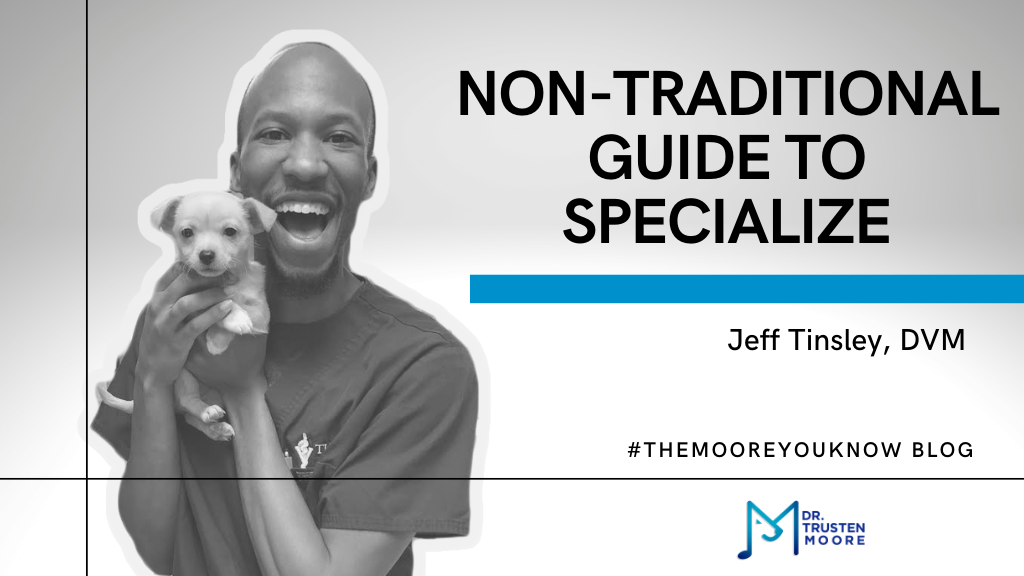Non-traditional Guide to Specialize

An important lesson I’ve learned in my three years as a vet is that your career is not a fixed destination. It’s just a part of your whole story. And every time I cross a huge finish line, I always feel like there’s another race to enter, which is a common theme amongst many vets. Whether you’re a student now or a vet five years in, I hope this will help those thinking about jumping into the specialty world.
The conventional track to specializing is four years in vet school, then one year in a rotating internship, then a 3-4 year residency. My road has taken me on a different magic carpet ride to reach my residency, and I’d like to share some tips that helped me get there. Welcome to my non-traditional guide to specialize!
Four Score and many a year ago, I graduated from undergrad at the University of Georgia in 2013. At the time, I had a strong affinity for avian medicine and moved on to become a member of the 2017 Class of Vet Med at Tuskegee University (Spoiler Alert: I did not become a bird vet).
During vet school, I did summer externships (which I highly recommend), which helped me explore my interests. They taught me that I was NOT going to like working with birds, but that I loved surgery.
I did the match program during my 4th year applying to small animal rotating internships, and I didn’t match. Instead, I spent 24 hours scrambling through a bombardment of emails, texts, calls, and smoke signals from programs all over the US seeking interns. Eventually, I chose a program robust with surgeons and other specialties then traveled to the Blue Pearl in San Antonio, Tx.
My rotating internship is where my gung-ho surgeon plan changed. After only four months, I realized I wasn’t as passionate about surgery as I thought I was. Plot twist: I couldn’t see myself long-term in that role at all. So I did what most sane, Type A, over-planners do when the plan goes awry… I panicked! I never showed it at work, but at home alone? I spiraled for weeks.
After some soul searching, I opted to try out general practice. I needed a break. My 80+ hour a week internship gave me a great foundation as a vet but took its physical and mental toll.
Thanks to my previous training, I thrived in GP (dusts off shoulders). Besides my deep disdain for dental medicine, I liked my job. I meshed well with my co-workers, the pay was better, good clients and patients too…but I was missing something. I was also really gravitating toward my skin cases.
The first time I thought seriously about pursuing a residency again was at a Derm CE dinner. After a great conversation with the speaker, she encouraged me to attend the North American Veterinary Dermatology Forum. NAVDF is the yearly Vet Derm meeting. So I did.
I highly recommend setting time aside to attend a national meeting for the specialty you’re interested in. Here’s how I approached mine. A few weeks before the meeting, I emailed the Derm speaker from the CE dinner, my vet school Derm professor, and the Derm mentor from my rotating internship. I explained my goals to look more into Derm, and all 3 of them were very supportive.
Using my small derm network, I navigated the meeting efficiently and met doctors/programs interested in a derm specialty intern or resident. I treated the experience like a job interview and even had an updated CV ready for distribution. After their lectures, I spoke with speakers, traded emails with numerous doctors, and had a few impromptu, informal interviews. I even met my future boss! I asked thoughtful questions, tried to be open-minded, and got an idea of what the process of specializing in Derm required.
I made a point of being very intentional with all my interactions, and it truly paid off. When I left, I made sure that I had scheduled some follow up phone interview or time to check in with all the programs I was interested in, which again, is something I highly recommend. At the meeting, my experience solidified that this was my path, and doing a residency was for me.
Now I needed to transition from GP to Derm. This was confusing and tricky. I enjoyed my regular GP job, but my heart screamed for Derm. Also, when things are in transition you don’t want to get ahead of yourself and speak as if you’re leaving before anything is set in stone. I needed to follow my heart, but I certainly felt guilty at work, because I couldn’t tell my staff all the details as they were happening in real-time.
A few months later, I shadowed at the Animal Dermatology Clinic (ADC) of Louisville. Shadowing a specialty hospital is a great idea for those interested in specializing. However, how much you tell your current hospital about your future opportunities is a personal choice, and everyone has to navigate it how they feel most comfortable. For me, I had been slowly letting people know I wanted to enter a derm residency, so they weren’t surprised when I wanted to visit a Derm clinic, and they knew it would be an excellent educational experience.
My visit went so well that it turned into something of a working interview, and a few weeks later, I was offered a formal Derm internship position. This position did not guarantee a residency but was designed to make me an excellent residency candidate. I took a deep breath, accepted that offer, and moved my life to Louisville, KY, in August of 2019.
To oversimplify the rest of my journey, I busted my butt, worked diligently (groveled minimally), and ADC opened up a residency right here in Louisville and put my name on it. I was (and still am) humbled, dumbfounded, and altogether floored by this, and I’m proud to say I’ll be starting my residency this July. How dope is that?!
Anywho, I hope my story inspires some hope to those who want to specialize even if you happen to be exploring the GP world right now. Specializing isn’t for everyone, but if you think it’s for you, then give it a shot, my friend!
———–

Leave A Comment